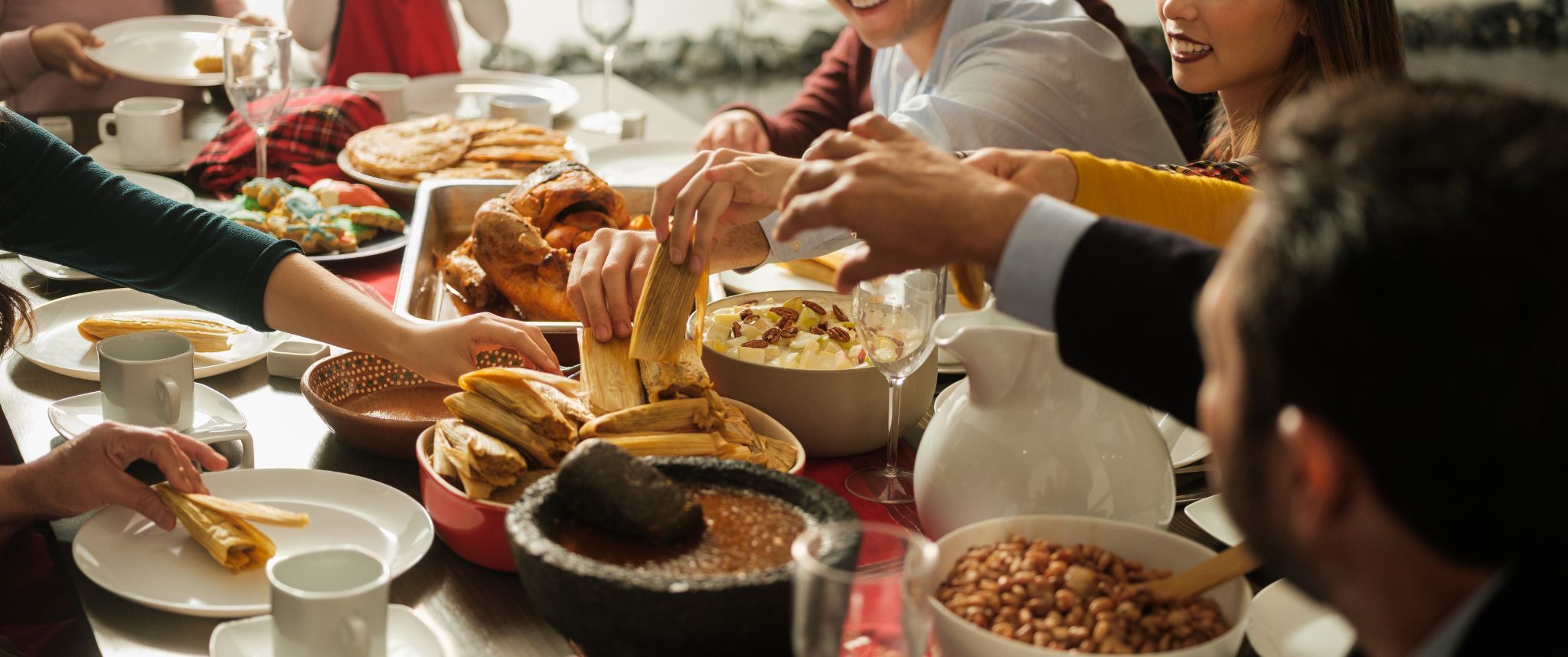One thing is clear at Globowl - we LOVE food! For many of us, the holiday season is about more than gifts and decorations. It’s about family, coming together, and—perhaps most importantly—food. From cherished recipes passed down through generations to the joy of preparing meals together, cooking plays a huge role in how we celebrate the holidays.
No matter which holidays your family celebrates, food is at the heart of gathering, tradition, and love. Here are some of our favorite holidays - explore how food brings us all together and think about how you can introduced these traditions and foods to your little ones.
Rosh Hashanah: A Sweet Start to the New Year
We just celebrated Rosh Hashanah, the Jewish New Year, marking the beginning of a season of reflection, renewal, and new beginnings. Central to this holiday are the symbolic foods that represent hopes for a sweet and prosperous year ahead.
Apples dipped in honey are perhaps the most well-known Rosh Hashanah treat, symbolizing the wish for a sweet year. But the holiday table is also filled with other traditional dishes, such as round challah (representing the circle of life), pomegranates (symbolizing abundance and mitzvot, or good deeds), and honey cake.
Cooking during Rosh Hashanah often involves bringing the whole family into the kitchen. Whether it’s braiding challah or preparing tzimmes (a sweet root vegetable dish), these recipes carry deep meaning. Preparing and enjoying these foods with loved ones turns the meal into more than just sustenance—it becomes a spiritual experience that ties us to our ancestors and our future.
Thanksgiving: A Feast of Gratitude
Thanksgiving, celebrated primarily in the United States, is a holiday that revolves around one central theme: gratitude. And what better way to express gratitude than through a delicious, home-cooked meal shared with family and friends? The Thanksgiving table is typically laden with comforting, classic dishes—turkey, stuffing, mashed potatoes, and cranberry sauce.
But the true magic of Thanksgiving comes from the memories made in the kitchen. For many families, cooking the Thanksgiving meal together is an annual tradition. From prepping the turkey to perfecting grandma’s secret stuffing recipe, Thanksgiving is a time for families to bond over food. It’s a chance to pass down family recipes and introduce new twists to old classics. Everyone contributes in their own way, whether it’s making the pie crust from scratch or simply mashing the potatoes.
For children, especially, Thanksgiving is a time to learn family traditions through cooking. It’s also a wonderful opportunity to reflect on the importance of food, family, and the act of giving thanks for all we have.
Christmas: Festivities Around the Table
When we think of Christmas, images of twinkling lights, cozy gatherings, and festive meals immediately come to mind. Christmas is celebrated in many ways across the world, but in nearly every culture, food plays a central role in the festivities.
In some households, Christmas Eve is marked by a seafood feast, like the Italian "Feast of the Seven Fishes." In others, it's all about the big Christmas Day roast, complete with ham, turkey, or even a crown roast. Desserts are equally beloved, from cookies baked and decorated with kids to indulgent sweets like yule logs, mince pies, or fruitcake.
Family traditions often shine brightest in the kitchen during Christmas. Baking Christmas cookies or gingerbread houses becomes a fun activity for young and old alike. It’s not just about the final product but about spending time together, laughing, and creating something that represents the love and joy of the season. Food is a gift in itself—one we prepare with care and share with those we hold dear.
Kwanzaa: A Celebration of Heritage and Community Through Food
Kwanzaa, celebrated from December 26 to January 1, is a vibrant holiday that honors African heritage, unity, and culture. Food plays a key role in Kwanzaa celebrations, particularly during the Karamu feast, which takes place on December 31. This communal meal symbolizes the values of the holiday: unity, responsibility, and sharing.
Traditional Kwanzaa dishes are often inspired by African, Caribbean, and Southern American cuisines. Collard greens, black-eyed peas, yams, cornbread, and spicy stews may all appear on the table. These dishes are not only delicious but also rich in history, representing the deep cultural roots of the African diaspora.
For families, preparing these meals together is a way to honor their heritage and teach the next generation about the importance of unity, self-determination, and collective responsibility. Kwanzaa cooking often involves sharing stories, reflecting on the Nguzo Saba (the seven principles), and reinforcing the sense of community and family.
New Year's: A Celebration of Hope and New Beginnings
The transition from one year to the next is always a moment of reflection and hope, and food plays an integral part in how we celebrate New Year's. In many cultures, certain dishes are believed to bring good luck and fortune for the year ahead.
For example, in the southern United States, black-eyed peas and collard greens are eaten on New Year's Day to bring prosperity and luck. In Spain, people eat 12 grapes at midnight—one for each stroke of the clock—to symbolize good luck for each month of the upcoming year. In Japan, long noodles (toshikoshi soba) are eaten on New Year's Eve to symbolize a long and prosperous life.
No matter where or how you celebrate, New Year’s food traditions are all about welcoming the future with hope and positivity. Preparing and enjoying these symbolic dishes with family is a way of sharing our hopes and dreams for the coming year, reinforcing the idea that, whatever the future holds, we’ll face it together.
Food: The Heart of Holiday Traditions
What makes food so special during the holidays isn’t just the taste—it’s the memories, the togetherness, and the love that goes into every meal. Whether it’s Rosh Hashanah’s honey cake, Thanksgiving’s pumpkin pie, Christmas’ roast, or New Year’s lucky black-eyed peas, holiday meals are about more than just eating. They’re about family traditions, about teaching the next generation, and about remembering where we come from.
As we head into this holiday season, take time to savor these special moments in the kitchen. Invite your kids to help prepare a meal, share family recipes, and reflect on the meaning behind each dish. After all, food has the power to connect us—across generations, across cultures, and across the table.





